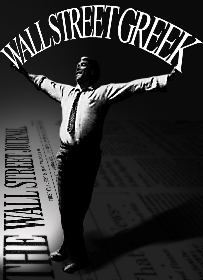Dogtooth Oscar Nominee for Best Foreign Film

Greek Film Flirts with Oscar!
Wall Street Greek Film & Theatre Columnist Penelope Karageorge takes a close look at Dogtooth, Greece's Oscar nominee for Best Foreign Film. Karageorge speaks with the film's stunned Writer/ Director Yorgos Lanthimos, and several others about the film and the Greek film industry, as Dogtooth takes the stage among the world's best.
Article interests NYSE: DIS, NYSE: DWA, NYSE: CNK, NYSE: RGC, NYSE: RLD, NYSE: LGF, Nasdaq: RENT, Nasdaq: CKEC, Nasdaq: LSTZA, NYSE: MHP, NYSE: PSO, NYSE: JW-A, NYSE: JW-B, Nasdaq: SCHL, Nasdaq: CRRC, NYSE: NED, Nasdaq: PEDH, NYSE: BKS, Nasdaq: AMZN, Nasdaq: BAMM, NYSE: BGP, OTC: LYFE.OB, Nasdaq: NOOF, OTC: PUBM.OB, OTC: IFLM.OB, Nasdaq: PTSX, Nasdaq: SAPX, OTC: AFFW.OB, NYSE: TWX, Nasdaq: NWSA and Paris: VIV.PA, NYSE: NBG, NYSE: OTE, NYSE: CCH, NYSE: TK, NYSE: NM, NYSE: NNA, NYSE: NMM, NYSE: TNP, NYSE: OSG, NYSE: ISH, NYSE: EXM, NYSE: SB, NYSE: SEA, NYSE: GNK, NYSE: DSX, NYSE: DAC, NYSE: TNP, NYSE: SFL, NYSE: NAT, NYSE: SSW, NYSE: GMR, NYSE: DHT, NYSE: BC, NYSE: MPX, Nasdaq: DRYS, Nasdaq: TOPS, Nasdaq: EGLE, Nasdaq: SINO, Nasdaq: PRGN, NYSE: KSP, Nasdaq: ESEA, Nasdaq: SBLK, Nasdaq: ONAV, Nasdaq: VLCCF, Nasdaq: TBSI, Nasdaq: GLNG, Nasdaq: XSEAX, Nasdaq: ACLI.
Dogtooth, Oscar Nominee for Best Foreign Film
 Greece's Dogtooth, a ground-breaking, tragi-comic film written and directed by Yorgos Lanthimos, has been nominated for an Oscar for Best Foreign Language Film. Dogtooth faced enormous competition in the international arena, with 66 films from around the world in contention.
Greece's Dogtooth, a ground-breaking, tragi-comic film written and directed by Yorgos Lanthimos, has been nominated for an Oscar for Best Foreign Language Film. Dogtooth faced enormous competition in the international arena, with 66 films from around the world in contention."Getting nominated was unexpected. It has made me and my collaborators extremely happy," Lanthimos exclaimed.
In Dogtooth, a husband and wife keep their children imprisoned in their house, where they play weird games and learn a language devised by their parents, while indulging in bizarre, sexless sex. It's funny, offensive, tragic and brilliant.
If Lanthimos was surprised, actor Christos Stergioglou, who plays the father, said he was "in a state of shock" over the nomination. "The film shows what stupidity can lead to – when you want to control everything, even under the pretext of love and protection. It is both a very serious and ridiculous subject!" Stergioglou said.
"This nomination is a fine tribute to Lanthimos," said NYC Greek Film Festival director James DeMetro. "He has made a strikingly original film that deserves the attention it has received worldwide. But the nomination is also wonderful for the Greek film industry. Greek films are shown all over the world, but the American market has been resistant and unwelcoming. This nomination is bound to attract attention to the Greek film industry. It sends a clear message that Greek filmmakers are turning out world class films that deserve to be seen."
The New York Greek Film Festival early committed to Dogtooth with a screening and panel discussion on the film, an event so successful that it had to move to a larger venue to accommodate an overflow crowd. An exceptional panel including Dan Georgakas, editor of Cineaste Film Quarterly; psychologist Dr. Tom Mallios; and Vangelis Caltychos, Columbia University professor, analyzed the film and discussed the intriguing issues that it raised.
A.O. Scott, film critic for The New York Times, pointed out: "Mr. Lanthimos is part of a Greek generation of filmmakers whose work is iconoclastic, formally daring and sometimes abrasive. These directors, in turn, are part of a loose network that spreads across much of the world, linked by the promise of festival exposure and the challenge of raising money in a worldwide climate of economic constriction."
"Their work is almost invisible here, though it commands a fair amount of attention in the flourishing and contentious cinephile wing of the blogosphere. But it is nonetheless available to anyone with the curiosity and patience to navigate the new, fast-evolving cosmos of V.O.D. and streaming Web video... a whole world of movies is out there waiting to be discovered."
Time Out New York senior film critic Joshua Rothkopf named Dogtooth one of the Ten Best Films of 2010.
The Oscars will be awarded tonight, Sunday, February 27, in Los Angeles. Films competing with Greece's Dogtooth include Denmark's A Better World; Canada's Incendies; Mexico's Biutiful; and Algeria's Outside the Law.

This article should interest investors in Disney (NYSE: DIS), DreamWorks Animation (NYSE: DWA), Cinemark Holdings (NYSE: CNK), Regal Entertainment (NYSE: RGC), RealD (NYSE: RLD), Lions Gate Entertainment (NYSE: LGF), Rentrak (Nasdaq: RENT), Carmike Cinemas (Nasdaq: CKEC), LYFE Communications (OTC: LYFE.OB), New Frontier Media (Nasdaq: NOOF), Public Media Works (OTC: PUBM.OB), Independent Film Development (OTC: IFLM.OB), Point 360 (Nasdaq: PTSX), Seven Arts Pictures (Nasdaq: SAPX), Affinity Medianetworks (OTC: AFFW.OB), Time Warner (NYSE: TWX), News Corp. (Nasdaq: NWSA), Vivendi (Paris: VIV.PA), Liberty Starz Group (Nasdaq: LSTZA), McGraw-Hill (NYSE: MHP), Pearson Plc (NYSE: PSO), John Wiley & Sons (NYSE: JW-A, NYSE: JW-B), Scholastic (Nasdaq: SCHL), Courier (Nasdaq: CRRC), Noah Education (NYSE: NED), Peoples Educational Holdings (Nasdaq: PEDH), Barnes & Noble (NYSE: BKS), Amazon.com (Nasdaq: AMZN), Books-A-Million (Nasdaq: BAMM) and Borders (NYSE: BGP), National Bank of Greece (NYSE: NBG), Hellenic Telecommunications (NYSE: OTE), Coca-Cola HBC (NYSE: CCH), Teekay Corp. (NYSE: TK), Navios Maritime Holdings (NYSE: NM), Navios Maritime Acquisition (NYSE: NNA), Navios Maritime Partners L.P. (NYSE: NMM), Tsakos Energy Navigation Ltd. (NYSE: TNP), Overseas Shipholding Group (NYSE: OSG), International Shipholding (NYSE: ISH), Excel Maritime Carriers (NYSE: EXM), Safe Bulkers (NYSE: SB), Claymore/Delta Global Shipping ETF (NYSE: SEA), Genco Shipping & Trading (NYSE: GNK), Diana Shipping (NYSE: DSX), Danaos (NYSE: DAC), Tsakos Energy Navigation (NYSE: TNP), Ship Finance Int'l (NYSE: SFL), Nordic American Tanker (NYSE: NAT), Seaspan (NYSE: SSW), General Maritime (NYSE: GMR), DHT Maritime (NYSE: DHT), Brunswick (NYSE: BC), Marine Products Corp. (NYSE: MPX), DryShips (Nasdaq: DRYS), Top Ships (Nasdaq: TOPS), Eagle Bulk Shipping (Nasdaq: EGLE), Sino-Global Shipping (Nasdaq: SINO), Paragon Shipping (Nasdaq: PRGN), K-SEA Transportation Partners (NYSE: KSP), Euroseas (Nasdaq: ESEA), Star Bulk Carriers (Nasdaq: SBLK), Omega Navigation (Nasdaq: ONAV), Knightsbridge Tankers Ltd. (Nasdaq: VLCCF), TBS Int'l (Nasdaq: TBSI), Golar LNG (Nasdaq: GLNG), Claymore/Delta Global Shipping (Nasdaq: XSEAX), American Commercial Lines (Nasdaq: ACLI).
Please see our disclosures at the Wall Street Greek website and author bio pages found there. This article and website in no way offers or represents financial or investment advice. Information is provided for entertainment purposes only.

Labels: Film and Theatre, Fine Arts, Karageorge






































